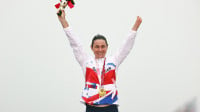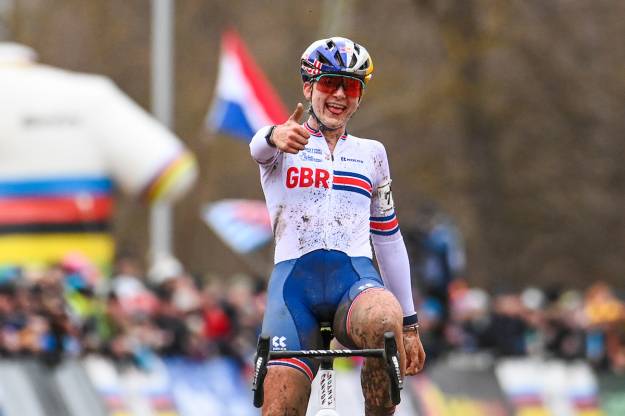Team GB have had many incredible moments at the Olympic Games over the years; we celebrate 10 magical memories ahead of Rio 2016.
Cooke and the women riders in Beijing
When Nicole Cooke won gold in the women’s road race in Beijing, it was a historic victory; a culmination of 10 years hard work by the Welsh rider – not only as a cyclist but in her tireless efforts to improve the status of women and girls’ cycling.

That hard-earned gold medal, won on the rain-soaked climbs underneath the Great Wall of China, was the first Olympic cycling medal won by a woman for Great Britain; but it would be far from the last.
2008 saw an explosion in women’s cycling talent in the Great Britain squad, with Rebecca Romero, Wendy Houvenaghel and Victoria Pendleton winning medals on the track and Emma Pooley backing up her support role to Cooke in the road race with a silver medal in the time trial.
By the time 2012 arrived and the likes of Lizzie Armitstead and Laura Trott became international cycling superstars, it was easy to forget what a breakthrough the previous Olympics had been for British female cyclists; pioneered by the uncompromising brilliance of Nicole Cooke.

Wiggins on his throne
Sir Bradley Wiggins was already having a bumper year in 2012 before the Olympic Games in London got underway, but it was his golden victory in the men’s time trial that affirmed his legendary status.
Wiggins already had six track cycling medals from three previous Olympics but it was this time trial, his first outing in a road event that captured the British public’s imagination.
Sat on a golden throne, rather than the usual plastic chair, reserved for the fastest finisher, looking cool as a cucumber with a haircut and sideburns any mod would be proud of, Wiggins winning moment became one of the iconic images of the 2012 Games.

Add in the quiet presence of bronze medallist Chris Froome and the Olympic moment becomes nearly as memorable for being the last time anyone can remember the three-time Tour de France winner coming third in anything…
Chris Hoy’s final Olympic final
Sir Chris Hoy already had four Olympic gold medals going into 2012 but the emotional outpouring from the rider and the gathered British crowds showed just what these final two record-breaking golds meant.

Hoy won his first gold medal at the Athens Games in the 1km time trial, but it was in Beijing that the Scottish rider became unbeatable, taking the title in the men’s keirin, sprint and team sprint.
Two gold medals in London made Hoy the most successful British Olympian of all time but it was seeing how much the achievement meant to the mild-mannered rider, and his mother in the crowd who couldn’t bear to watch, that made Hoy’s final trip to the top of the podium such a special moment.

Chris Boardman
In the 1992 Barcelona Games, Chris Boardman arrived as an out of work 23-year-old carpenter from the Wirral and left as an Olympic champion.
Winning Great Britain’s first cycling gold medal since Thomas Lance and Harry Ryan won the tandem race in 1920, Boardman also made headlines for his unique British-made Lotus Superbike bike.

Boardman did not even have to complete the whole race, catching his opponent, reigning world champion Jens Lehmann with a lap to spare and in doing so changed his own fortunes and kick-started the modern British love affair with cycling.
Laura Trott
Laura Trott burst onto the Olympic scene in 2012 winning, along with her teammates Dani King and Joanna Rowsell, the inaugural women’s team pursuit Olympic title and breaking three world records on their way to gold.

The then 20-year-old Trott went on the win the gold medal in the women’s omnium, snatching victory in the sixth and final event from American rider Sarah Hammer.
Trott optimised the spirit of the London Games, her pure joy and surprise at her performance captured the feeling in the UK, as the sun-soaked capitol hosted a phenomenal Games that no one could have seen coming.

Team Pursuits across the generations
The Great Britain Cycling Team has won a medal in 16 Olympic team pursuit finals, out of a possible 24; an incredible record.
Countless British line-ups have beaten the world record on their way to one of those medals, including the quartet of Frank Southall and brothers Harry, Percy and Lewis Wyld, who beat the record by 9.2 seconds to set a time of 5:01.6 in 1920.

Fast-forward to London 2012 and the quartet of Ed Clancy, Peter Kennaugh, Steven Burke and Geraint Thomas set a new world record time of 3:51.659 in their ride to one of the British team’s seven gold medals from the games.
Ed Clancy has been a member of the modern men’s pursuit squad on all five of the occasions they have set a new world beating mark; the first man will once again be leading out the squad in Rio and all signs indicate that they might just do it again…

Queen Victoria says goodbye
Victoria Pendleton had one gold medal to her credit already when she arrived at her second, and final Games in London.
The sprinting superstar, already a nine-time world champion over the various sprint disciplines, cemented her place in history with a second gold at her home Games.

The victory made her the first British woman to win back to back gold medals in consecutive Olympiads; doing what so many other great athletes could not.
Pendleton’s emotional farewell to the crowd, who showed her their appreciation for her years of sacrifice and dominance, was one of the most memorable and moving in Games’ history.

12 hours of madness
Not in living memory, but certainly one of the most admirable performances in any Games since; Frederick Keeping was among the first riders to represent Great Britain in a cycling event, at the first Olympic Games in Athens 1896.
A servant who worked at the British Embassy in Greece, Keeping was nearly barred from competing at the Games as he and fellow rider Edward Battell worked for a living, and were not gentlemen so could not be considered amateurs.
The protests were overruled and Keeping went on to contest the 12 hour race, where riders rode as many laps of the track as they could in a 12 hour period.

Without the benefits of support cars, feed stations or even an enthusiastic crowd to sustain them, Keeping was the second of only two athletes to finish the gruelling race, covering 314.664km, only on lap behind the winner Adolf Schmal.
Not the glorious podium finish awaiting modern riders, but Keeping had buckets of the grit and courage that we are so accustomed to seeing the Great Britain Cycling Team drawing on today; a ride worth remembering.
Britannia Rules
British riders have been a dominant force in track cycling for nearly a decade, but back in 2008 the emergence of Chris Hoy, Rebecca Romero and Jason Kenny was astonishing.
The women’s individual pursuit gold medal final was contested between Romero, who was already making history for being the first British woman to compete in two different sports at the Olympic Games, and fellow Brit Wendy Houvenaghel.

The gold went to Romero, making her the first British woman to win an Olympic title on the track, while Houvenaghel took the silver for the Great Britain team.
20-year-old Jason Kenny went against his teammate and already two-time gold medallist in Beijing, Chris Hoy, in the men’s sprint. It was silver Kenny this time but it’s been gold ever since for the rider from Bolton.

With individual medals for Bradley Wiggins, Steven Burke, Ross Edgar, Chris Newton, Victoria Pendleton and the men’s team sprint and pursuit squads, it was the largest medal haul ever for the British team.
Queally triumphs after near-fatal crash
On the surface Jason Queally winning Great Britain’s first gold medal of the Sydney Olympics was an achievement in itself but accompanied by the fact that he had only returned to track cycling tentatively following a near fatal accident, then the achievement becomes all the more impressive.

In 1996, Queally had nearly died in an accident at Meadowbank cycling track in Edinburgh when an 18-inch sliver of the wooden track entered his chest via his armpit.
The accident, which required him to have 70 stitches, resulted in the British rider never cycling in a group race again, focussing instead on the sprints and time trial.
Queally’s golden moment in Sydney was also an agonising one, as he watched three fellow competitors try, and fail, to beat his new Olympic record time before he could savour his gold.









